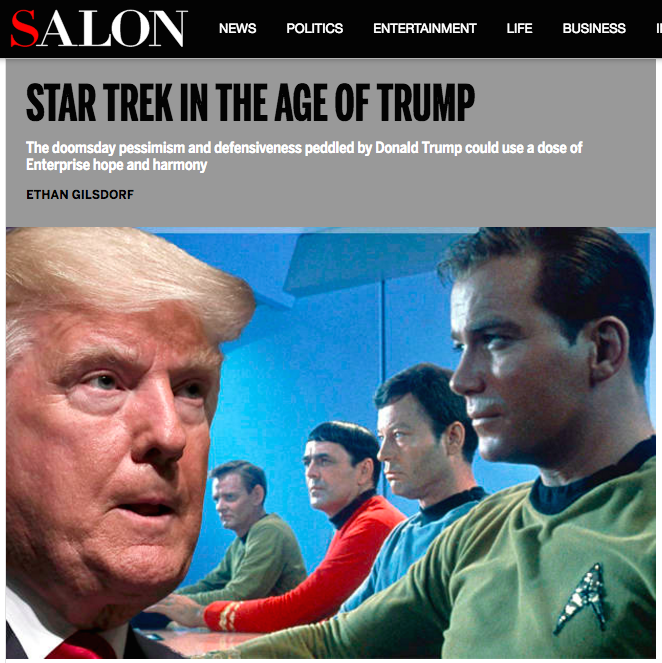“Star Trek” in the age of Trump
I wrote this piece for Salon called “Star Trek” in the age of Trump: Why we need to embrace its 50-year mission now more than ever," which looks at why the doomsday pessimism and defensiveness peddled by Donald Trump could use a dose of Enterprise hope and harmony.
Why I'm against online comment forums
Why am I against online comment forums? Increasingly, I see ad hominem attacks, “you’re a loser” name-calling, and Donald Trump-style playground insults --- all of which have come to pass for grown-up debate in America. Read the rest over on WBUR's Cognoscenti.
Hollywood, ditch the childhood nostalgia trip
 I had a piece in USA Today today about Hollywood and Madison Avenue resurrecting dead franchises from the hoary childhoods of Gen Xers.
I had a piece in USA Today today about Hollywood and Madison Avenue resurrecting dead franchises from the hoary childhoods of Gen Xers.
 I had a piece in USA Today today, about Hollywood and Madison Avenue resurrecting dead franchises --- Battleship, Transformers, Dr. Seuss' The Lorax, GI Joe, The Lego Movie, Mr. Peabody & Sherman, Muppets Most Wanted, Peanuts -- from the hoary childhoods of Gen Xers. Yes, the movies have been busy trolling the deep sea waters of our collective nostalgia for childhood media. Seeking the next franchise, they dredge up another toy or TV show to see whether new life can be breathed into it for another generation's pleasure.
I had a piece in USA Today today, about Hollywood and Madison Avenue resurrecting dead franchises --- Battleship, Transformers, Dr. Seuss' The Lorax, GI Joe, The Lego Movie, Mr. Peabody & Sherman, Muppets Most Wanted, Peanuts -- from the hoary childhoods of Gen Xers. Yes, the movies have been busy trolling the deep sea waters of our collective nostalgia for childhood media. Seeking the next franchise, they dredge up another toy or TV show to see whether new life can be breathed into it for another generation's pleasure.
Obscene income inequality is immoral
 The current disparity between what executives make vs. rank-and-file employees is nothing short of immoral. But sadly the battle for improved pay equity across America’s workforce isn’t going to be won anytime soon.
The current disparity between what executives make vs. rank-and-file employees is nothing short of immoral. But sadly the battle for improved pay equity across America’s workforce isn’t going to be won anytime soon.
 The current disparity between what executives make vs. rank-and-file employees is nothing short of immoral. But sadly the battle for improved pay equity across America’s workforce isn’t going to be won anytime soon.
The current disparity between what executives make vs. rank-and-file employees is nothing short of immoral. But sadly the battle for improved pay equity across America’s workforce isn’t going to be won anytime soon.
In 2012, CEOs of S&P 500 companies made, on average, an astounding 354 times more than the average U.S. worker, according to the AFL-CIO. The ugly numbers continue. Of some 141 countries, the U.S. ranks fourth highest in “wealth inequality,” trailing only Russia, Ukraine and Lebanon.
But there is hope. Some companies — admittedly, a vast minority — do voluntarily cap their top executives’ salaries. For example, Whole Foods Market won’t pay its CEO more than 19 times the company’s average annual wage.
You can read the rest of my column for WBUR's Cognoscenti here.
